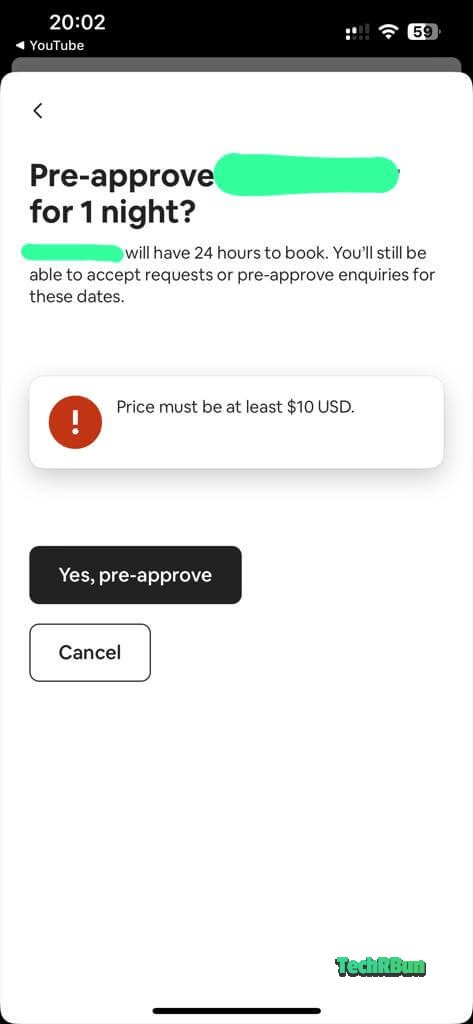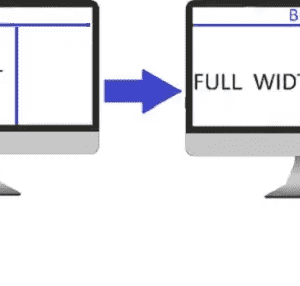
Navigating the digital landscape of Airbnb booking, encounter with the ‘Price must be at least $10 USD’ error message is not a rare occurrence for hosts attempting to preapprove requests under this amount.
This integral factor of the peer-to-peer rental mogul’s online system is much more than a mere system constraint – it’s a crucial cornerstone in securing a level playing field for hosts and guests alike.
This article aims to peel back the layers behind Airbnb’s minimal pricing requirement, its impact on stakeholders, and the potential solutions and technological opportunities that can circumvent this constraint but remain within the platform’s mission and guidelines.
Table of Contents
The Minimum Price Requirement in Airbnb’s Preapproval System
Unraveling Airbnb’s $10 Minimum Preapproval Price: A Tech Analysis
Airbnb, a titan in the realm of online hospitality services, enjoys a user base that sprawls across the globe.
However, one aspect of its system tends to bewilder even the most tech-savvy enthusiasts: the enforcement of a $10 minimum price on preapproval requests.
Today, let’s delve into the rationale behind this seemingly quizzical policy and how this tech-based limitation serves Airbnb and its users.
Airbnb’s system design aims to balance user experience, business strategy, and technical feasibility.
The $10 minimum on preapproval requests is no exception. An immediate and surface-level reason is evident: to deter non-serious or prank bookings, and to ensure a minimum profit margin for hosts. Both of these contribute to the overall goal of maintaining a stable and credible platform for all users.
Digging a level deeper, a profound business principle emerges.
In the world of online services, overhead costs do not typically scale with the price of the product or service. That means it costs Airbnb just as much to process a $1 reservation as a $1,000 one. Implementing a $10 floor shields the company from incurring losses on low-priced listings. However, it still leaves room for affordable deals, aligning with Airbnb’s mission to make travel easy and accessible.
From a tech perspective, the capacity to maintain a user-friendly, secure, and efficient platform is one that requires major resource allocation. Each transaction summons a slew of processes, from updating databases, maintaining secure payment systems, to triggering notifications, and possibly more. A lower limit on transaction value fuels efficiency, ensuring that the technological efforts expended are worth the output.
Airbnb, just like other technology giants, uses sophisticated algorithms to establish and maintain prices. These algorithms take into account multiple factors including location, type of property, duration of stay, local laws, and even the reputation of the host. In such a data-heavy environment, standardizing a minimum transaction value aids in creating a baseline for algorithmic modelling, simplifying data processing, and ensures a smoother user experience.
Lastly, it’s important to remember that Airbnb operates in an international arena bespattered with various tax laws and regulations. A minimum price requirement aids in ensuring compliance with laws related to the minimum taxable amount in certain jurisdictions.
While the policy might initially seem less accommodating, it is clearly a cornerstone in Airbnb’s strategy to safeguard their platform’s reputation, profitability, and operational efficiency.
This exploration of Airbnb’s $10 minimum preapproval price not only illuminates their motivations but bolsters our appreciation for technology’s role in establishing and maintaining thriving online marketplaces. The integration of business strategy in platform design is indeed a fine balance, one that Airbnb seems to navigate nimbly.

Impacts of this Requirement on Hosts and Guests
Unpacking the Impacts of Airbnb’s $10 Minimum Price Requirement
In the ever-evolving world of tech-driven platforms, Airbnb’s recent introduction of a $10 minimum preapproval price has created ripples far and wide. This strategic move, while seemingly simple, is a testament to the intricate balance of technology, business strategy, and user experience. Exploring beyond the surface-level motives, one uncovers a multitude of impacts that this price change has on hosts and guests alike.
For hosts, this minimum price introduces an interesting proposition. The straightforward consequence is the guarantee of a certain level of income from each booking, which subtly contributes to the perceived value of their listing.
Furthermore, the $10 minimum price requirement creates a benchmark, prompting providers to evaluate both intrinsic and extrinsic value while setting their listing price. This value-driven approach ultimately encourages increased investment in the quality of the experience offered, fostering a competitive market which can lead to higher overall quality.
From the other end of the spectrum, guests encounter an altered dynamic. This new floor price eliminates the possibility of ‘too good to be true’ deals, setting a realistic expectation of what’s feasible within the platform. However, for price-sensitive guests, this change could present an obstacle. On the upside, the minimum price policy can help to cement trust in the quality of Airbnb’s listings. After all, a nominal guarantee of quality often feels more dependable than an unpredictable deal.
From a broader perspective, this policy plays a pivotal role in shaping Airbnb’s platform integrity. By setting a minimum price, Airbnb provides a tangible barrier against potential fraudulent activities. This simple yet effective tactic significantly reduces the chances of scam listings, which further enhances the trust within the community.
On the taxation front, this move ensures a safe transactional boundary, aligning with compliance frameworks to avoid convoluted microtransaction scenarios. By establishing this minimum requirement, Airbnb simplifies the tax calculations for hosts, thereby easing overall compliance efforts.
In an industry where perception and profitability can make or break success, Airbnb’s $10 rule is a strategic maneuver to secure its position. Although it may have been propelled by multiple business reasons or regulatory requirements, this decision offers an intriguing study into how a tech platform can shape user behaviors, market dynamics, and the overall digital economy.
Airbnb’s enforcement of minimum pricing serves as a testament to the interplay between business strategy and technological utility. As we look ahead, it’s intriguing to contemplate how such pricing policies could impact both the competitive landscape and users’ adaptability. Just remember, whether you’re providing the experience or participating in it, understanding the implications of this rule will be fundamental for navigating the Airbnb ecosystem.

Possible Solutions and Alternatives
Despite the initial part of the article already diving deep into Airbnb’s $10 minimum preapproval price strategy, hosts and guests might still struggle in navigating this price constraint. However, rest assured, with some creativity and openness, alternative solutions can be found, harnessing technology to benefit both parties.
Many hosts often rely on bulk bookings to counteract this limitation. Listings that commonly attract long-term stays, such as those ideal for student lodgings or temporary work placements, can leverage this approach. Thanks to Airbnb’s feature that allows discounts for longer-term bookings, even a month-long booking at $10/night transforms into $300, a more palatable sum for hosts.
Moreover, Airbnb facilitates collective or group hosting. A group of hosts can come together to share the overhead costs and resources. A good tech feature here is automated coordination tools which can ease this collaboration, addressing issues such as fair division of proceeds, resolution of conflicts, and management of the shared listing.
Location-based pricing can also be a win-win situation for both hosts and guests. For instance, an Airbnb host in a popular, high-demand destination can evidently command higher prices. Automated analysis and data tracking for demand spikes in certain seasons and regions could help hosts price their listings competitively while still aligning with the $10 minimum requirement.
For guests, planning ahead often results in reduced accommodation expenses. The trend of fluctuating prices based on off-peak and peak travel times can be forecasted, thanks to predictive algorithms. This allows travelers to secure budget-friendly rates without the hosts compromising on their minimum pricing policy.
Ultimately, the Airbnb platform is designed to be mutually beneficial for hosts and guests. For hosts, it’s about more than just meeting the minimum price tag; it’s about providing quality, competitive offerings resulting in satisfied, repeat guests. Thanks to technological advancements in automated pricing, data analysis, and predictive modeling, overcoming price constraints and gauging business viability has become strategically smarter and more effective.
Embrace the challenge as an opportunity for innovation. Leverage automation and algorithms to not just navigate the Airbnb ecosystem, but to thrive within it. As technology progresses, so too does the ability to adapt, automate, and ultimately, succeed in the ever-changing, tech-savvy world of online marketplace platforms. This adaptability is not just about surviving, but excelling in the industry; not just keeping pace, but setting it.
Remember, constraints often stimulate creativity and innovation. Embrace them to thrive in the increasingly sophisticated and automated landscape of online real estate marketplaces.

Tech Perspective: Automating Airbnb’s Price Constraints
It’s clear that Airbnb’s introduction of the $10 minimum preapproval price strategy is a game-changer. The dynamic imposes certain constraints – but understanding those constraints can pave the way for inspired tech solutions.
Beyond their primary economic roles, hosts and guests can maintain a mutualistic relationship where the success of one aids the success of the other. Herein lies the opportunity for tech innovation to step in and compensate for any shortfalls associated with this new pricing strategy.
For Airbnb hosts juggling multiple listings, the challenge could be navigating the $10 constraint while ensuring profitability. One promising solution may well lie in bulk bookings through collective or group hosting. This method could not only ensure that all listings are booked, but it could also ensure that hosts reap maximum benefits despite price constraints.
Coupled with automated coordination tools for managing shared listings, this approach could significantly alleviate the revenue hit that hosts could otherwise experience.
It’s also worth considering a location-based pricing model. For instance, hosts in cities with a higher cost of living could potentially charge more for their listings to compensate for the increased operating expenses. Through data analysis and unique pricing algorithms, this pricing model could adapt to the host’s specific location, factoring in aspects such as local demand, ongoing events, and even the weather.
Another potential resolution could involve forecasting fluctuating prices based on off-peak and peak travel times. By leveraging machine learning and predictive modeling, Airbnb could implement a dynamic pricing system that proposes listing rates not only based on static factors, such as location or listing quality, but also on changing elements like local festivities, seasonality, and market dynamics. This could ensure that hosts are making optimal profits during peak times to balance quieter off-peak periods.
Even within these constraints, the benefits of Airbnb for both hosts and guests remain apparent. The platform’s immense popularity attests to this – and there lies an opportunity for technology to ease some of the impact of these constraints, turning them into game-changing innovations that could benefit all parties involved.
In Starbucks’s language, there’s no tall challenge that can’t be made into a grande opportunity – and the advent of new tech could be the magic ingredient in Airbnb’s venti cup.
Automation is being embraced more than ever, with algorithms playing a vital role in online marketplace platforms. With the continued refinement and advancement of these technologies, the constraints Airbnb faces today may pave the way for the groundbreaking innovations of tomorrow.
This current challenge underlines the intricate dance between business strategy and technological utility. For Airbnb to continue to thrive in the industry of online real estate marketplaces, it must link its strategic business goals with the power of technological innovation.
In this connect-the-dots situation, the lines are made up of code, and the image forming is a vibrant and more automated future. These potential tech innovations signal a promising future in an industry that’s constantly shaping and reshaping the landscape of travel and accommodation.
Airbnb’s adoption of these advancements could help ensure that, despite potential constraints, it continues to lead the pack in the evolving online real estate marketplace.

Scouring the contours of Airbnb’s built-in price constraint reveals a versatile matrix of impacts, potential narratives, and glimpses into the future of digitally mediated home sharing.
As we established, the ‘Price must be at least $10 USD’ message is a system-based guardian angel, protecting the sanctity of the fair and profitable hosting ecosystem.
Hosting or getting a booking under this amount might seem lucrative at first sight, but the broader picture showcases a potential undercutting of the market and a ripple effect on standard rates.
However, technology-forward solutions and alternatives could offer opportunities for more nuanced negotiations and exceptions, opening a gateway to more convenience. Given the ever-evolving dynamics of online marketplaces, continuous adaptations and adjustments are an inevitable part of ensuring a sustainable and balanced shared-economy landscape.







